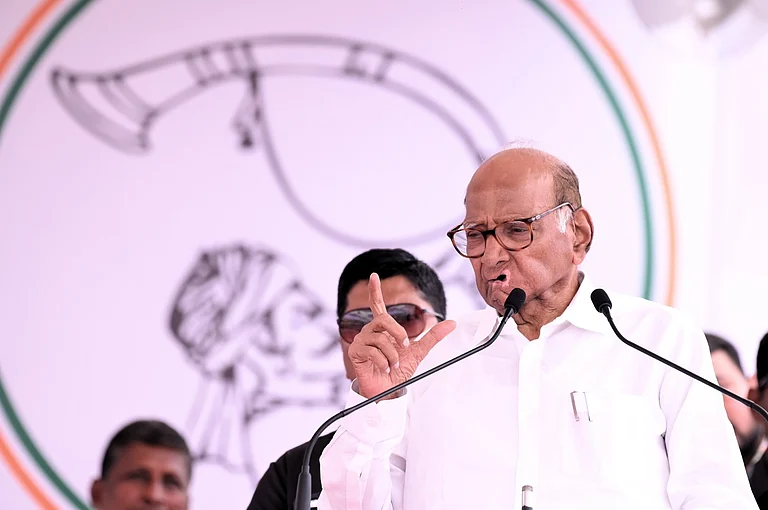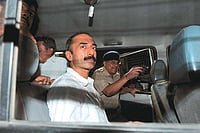With polls on their mind, rival political parties have adopted rigid positions on the killing of eight SIMI boys who allegedly escaped from the Central Jail in Bhopal. While the Madhya Pradesh government and the party in power in that state, the Bharatiya Janata Party (BJP), defend the police action, the Congress and other smaller opposition parties have called the action a “fake encounter”.
If the votes to be harvested in elections are to be the arbiter in such matters, the BJP will win! Middle-class Hindus, in particular, feel a sense of security when such terrorists are eliminated by the police or security forces. The number of enthusiasts for such killings outnumbers those who denounce the short-cuts used. The BJP seems confident that it will gain political mileage in forthcoming electoral jousts if strong, decisive action by the security forces becomes an election issue.
I remember how Gopinath Munde, as home minister of Maharashtra in a previous Shiv Sena-BJP government, openly said in the assembly that he had directed his police force to eliminate anti-social elements in Mumbai. The statement was welcomed by the well-heeled as it heightened their sense of well-being and security! It did not seem to bother him at all that his orders were not based on the law!
Amnesty International, which monitors human rights violation in different countries, had remarked in an old report that in India, there was widespread public acceptance of custodial violence and, I could have added, extrajudicial killing too, by the police. The reasons for such acceptance are not hard to fathom. In India, the judicial process and system just do not function; the consequences do not bode well for the common man, and also, tragically, the police. The corruption and inefficiency indices in our justice system—be it at the level of the police, prosecutors, defending advocates, judicial officers or jailers—are so high and pathetic that public pressure, transmitted through the political leadership, forces the police to resort to such measures to justify their own existence!
The police is the first point in the judicial process system. The offence is registered by the police and investigation begins. There was a time when supervision levels in the police ensured a fairly steady level of investigation and of justice, but this level has, alas, not been maintained. Politicians have emasculated the quality of police leadership by misusing their power to make appointments and transfers at will to reduce the professional leadership to a mere memory of its old self.
There has been a gradual but perceptible change in the value systems within the police—from the desire to get “a job well done” to a “get rich at any cost” mentality, which has in fact gripped all sectors of society in our country. The different cogs in the judicial process system, starting from the investigators and ending with the jailers, have inevitably been bitten by this bug. And therein lies the reason for “fake encounters” and also the cure for this malady. Unless the judicial process and system are put back on track, no solution is possible for this unlawful, illegal, uncivilised practice adopted by all police forces across the country. In this “short-cut” method, adopted when pressures from the public and the political leadership mount, the police become the investigators, prosecutors, judges and executioners, all rolled into one! It is a very dangerous tendency. The probability of police officers turning into ‘criminals in uniform’ is immense. It is, in fact, inevitable! ‘Encounter specialists’ who have become “matinee idols” overnight have also become immensely rich! And with riches come power and the ability to influence and worm their way into the highest corridors of power.
These are realities that politicians need to face before they endorse short-cuts such as extra-judicial killings of the variety that is currently being debated. They may reap quick rewards in the shape of votes and electoral gains, but in the long term, the results are going to be awesome and frightening.
Putting the judicial process and system back on track is a tall order indeed. The entire system has been so badly eroded with the passage of time that it will need Herculean efforts on the part of the Supreme Court of India and the Union home and law ministries to succeed. But a beginning needs to be made by getting all the principal players together on one platform to determine the cause of the cancer and then to find solutions.
The judiciary, for example, needs to put its own house in order to set the ball rolling. It wastes a lot of time in adjournments and routine when it should be more involved in the core work of adjudicating on the facts and the interpretation of laws. Politicians should try and understand that their role is not to run a police force. That should be left to carefully chosen professionals. The political leadership’s job is to see that these selected leaders go about their work in a lawful and dedicated manner without crossing any red line.
(Julio Ribeiro was DGP of Punjab during the militancy. He’s the author of Bullet for Bullet: My Life as a Police Officer.)
























